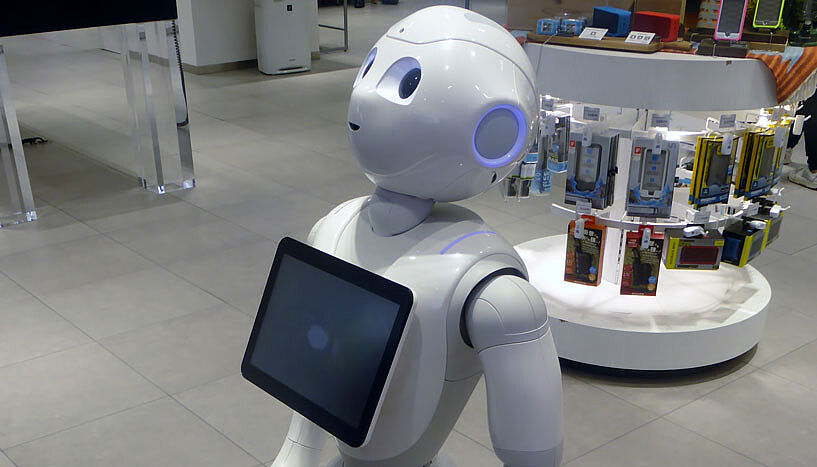"Robophilosophy": Exploring the consequences of a robot revolution
31. Januar 2018
The emergence of humanoid robots results in socio-political, sociocultural, economic and ethical challenges (Copyright by Tokumeigakarinoaoshima (Own work) [CC0], via Wikimedia Commons).
International Research Conference "Envisioning Robots in Society—Politics, Power, and Public Space"
From February 14 to 17, the University of Vienna is going to host in collaboration with Aarhus University (AU) some of the greatest thinkers from the field of humanities research on social robotics. Approaches and ideas are presented under the theme "Envisioning Robots in Society – Politics, Power, and Public Space", with involved disciplines ranging from philosophy, robotics, anthropology and psychology to law and economy. The conference program features keynotes by Joanna Bryson, from the Department of Computer Science at the University of Bath, and Hiroshi Ishiguro from the Intelligent Robotics Laboratory at Osaka University, among others.
The biennial series was inaugurated in 2014 as the world's first series in this field by the international research network Transdisciplinary Studies in Social Robotics (TRANSOR). The Robophilosophy conference of 2018 will focus on philosophical questions raised by social robotics in all systematic areas of philosophy; e.g. ontology, metaphysics, philosophy of mind, epistemology, and ethics. However, since robophilosophy is interdisciplinary by definition, it concerns researchers in philosophy, robotics, anthropology, psychology, cognitive science, linguistics, law, economy, sociology, and art.
"The thematic focus on economic, societal, and policy aspects of robotics is timely, urgent, and highly rele-vant given ongoing transformations in industry and in society," says Professor Mark Coeckelbergh, philoso-pher of technology and main organizer of the conference. Automation is seen as the new key strategy for productivity gain—many countries are well on their way towards the production model of "industry 4.0", where software bot and robots will appear in all industrial sectors including service industries.
The current development is spurred by robotics, producing ever more intelligent, ever more connectable artifi-cial agents that function in ever more complex physical and social surroundings. This raises a host of ques-tions for policy-makers, engineers, and researchers such as: Which socio-political, socio-cultural, economic, and ethical challenges will we humans be confronted with as robots will be included into more and more con-texts of our everyday life? Are we bound to increase the precariat or will the “robot revolution” open up new paths towards greater social justice? How should we envision robots in society?
Robophilosophy 2018 emphasizes the context of policies and decision making. National ethical and legal councils, such as the newly founded Robotics Council in Austria, have been installed to support policy mak-ers in facing the changes that automation will likely engender. Evaluating ethical and societal impacts of these changes is crucial. However, innovation as well as ethical and cultural values have to be kept in mind.
"Policy makers have to understand that economic considerations alone must not prevail," says Coeckelbergh. Researchers, policy makers, engineers, and corporations jointly share the burden of responsibility for shaping the course of the "robot revolution". Defining, bearing, and sharing responsibility is one of the crucial chal-lenges when it comes to envisioning robots in society.
Sponsors of the conference: Carlsberg Foundation, BMVIT (Austrian Federal Ministry for Transport, Innovation and Technology), Danish Council for Independent Research
Program: www.robo-philosophy.org
International Conference "Robophilosophy 2018 – Envisioning Robots in Society: Politics, Power, and Public Space"
Date: Wednesday, February 14 to Saturday, February 17, 2018
Venue: Campus der Universität Wien, 1090 Vienna, Spitalgasse 2
Wissenschaftlicher Kontakt
Univ.-Prof. Dr. Mark Coeckelbergh
Institut für PhilosophieUniversität Wien
1010 - Wien, Universitätsstraße 7
+43-1-4277-464 66
+43-664-602 77-464 66
mark.coeckelbergh@univie.ac.at
Rückfragehinweis
Mag. Alexandra Frey
Media Relations ManagerUniversität Wien
1010 - Wien, Universitätsring 1
+43-1-4277-17533
+43-664-8175675
alexandra.frey@univie.ac.at
